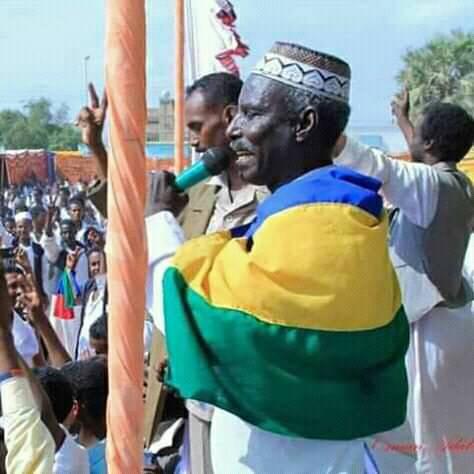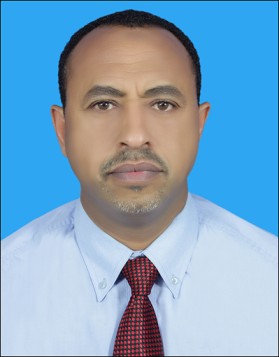The Role of Arka Saber’s Songs in the Sudanese Revolution

Mahmoud Muhammad Saber or Arka Saber, who was also known as the Beja Revolution Poet (BRP), was born in 1960 in a village in Hamashkorib District in Kassala State. As one of the citizens of eastern Sudan, he learned Quran and Islamic Sciences in a Quranic school called ‘Khalwa’ with his teacher Sheikh Ohaj Osham.
Later, he served in the Sudanese Army Forces in Kassala and Jabal Awlia where he was ranked the first sergeant. On 27 April 1996, Arka decided to join the forces of the Beja Congress with his most powerful military background knowledge and fighting experience. It was reported that he was badly treated and he also heard words of contempt from his commander in a camp called Abu-qamul.
Since the first days, the Beja Congress forces leaders were excited and convinced with the multi-fighting skills that the recently joined fighter possesses. They recognised him as a strong and brave fighter with amazing skills in inspiring other colleagues in the battles. They also realised that he had excellent technical abilities in training others on various weapons when he was assigned to support beginners.
In a short time, as a result of his genius language status and conviction with the Beja Congress Principles, he aimed to contribute with another outstanding value. Therefore, he publicised these Principles in songs in the Beja language; ‘Bejawiet’ and they were later sung and accepted by the community. As a result of the influence of these songs, a huge number of people were persuaded by these Principles in Port Sudan and Kassala states. Other Beja locals and even those who were part of the established government found his songs reliable as they were calling for Beja rights especially when they presented by the well-known Beja singers such as Seedi Doshka, Mohammed Al Badri and others. In addition, Bejawiet speaking students at Sudanese universities established paralleled bodies calling for rights of Beja-based on the Congress Principles from one side and also coordinated with other Sudanese parties by uniting with their programmes against the established government on the other side.
Arka’s songs employed in the majority of the students’ activities at Sudanese universities and were also locally becoming common in most of the Beja social gatherings. Although Arka is a modern poet and singer, his uncounted songs are not written; however, his colleagues recorded some of his work through their mobile phones. These days, there are serious attempts of collecting his work from his friends and family in one album through a community forum for this purpose on social media. This article briefs the bio-data of the great poet who passed away in March 2021 with reference to one of his most efficient and famous song, “Tuqadiyay“-/tu-gǝ-đi-jᴂj/, which is borrowed from Arabic word, “Al-qadhiya” that means ‘the problem”. In the song, he counted all the possible rights of Beja people in simple and understandable words.
Rhetorical expressions in Arka Saber’s songs
Despite the simplistic language that the legend Arka Saber used in his poems, finding equal words for the revolutionary expressions was one of the challenges that faced this paper. As many Bejawiet speakers preferred to call Arka the ‘Beja Revolution Poet’, others loved to call or nickname him ‘the professor’ because of the rhetorical devices that he used in his songs to enhance the Beja Congress Principles.
In one of the interviews with the journalist, Othman Aadab, the poet Arka said, ‘The Beja locals who were fully involved with authority and high political positions in the established government stigmatised us with disbelieving at sometimes and lack of objectivity at others; therefore, there had to be another way of addressing the issue by looking out of the box, in order to convince these leaders as well as the public people’.
Arka Saber used a huge number of Arabic origin words in his poems to easily convey the message to the established government, from one side, and also to allow the accessibility to the meaning of his words to the other partners in the Sudanese revolution, especially those who do not speak Bejaweit. In this sense, he used deep and well-structured expressions that can accept more than one possible meaning. Thus, whoever listens to his songs was proud of him as he was calling for nationalism and Sudanese unity as well as the regional soul in his poems.
The below poem, ‘Tu-qadhyay’, details the key objectives of the Beja Congress leaders who were promote the calling for these rights to a military fighting of the central government.
| Transcription | English | Lines in Arabic | Lines in Bejawyat |
| /tu-qǝdjᴂj kunᴂb-bᴂkᴂj mǝsi bᴂ-fᴧkǝrǝi t-hei-neik/ /tɔ:nǝ tihɔi nif-reit kǝs-tǝuh wǝd͡ʒhs-ǝndiǝ sinᴂkrnǝh/ | For those who did not know our problem and did not yet think about how we suffered, I will detail the reasons for fighting | للذين لم يعرفو قضيتنا ولم يفكرو في معاناتنا سافيدكم السبب الذي من اجله خرجنا وناضلنا | توقضياي كناب باكاي مسي بافكري تهنينك تونا تهوي نفرئيت كستو وجّهسي اندي راتنيو؟ |
| /ǝm-ʃᴂb tis-ti-bᴂl-jᴂ-ti:b iʃǝ qi:qǝ b?-sǝt ti:-d-hɔb / /fǝ’d͡ʒr eit-jhǝub ǝjᴂ sᴂn-ni meheili/ / nᴂ-wi tǝ-kw-ei-t qǝ-tu/ | When you leave your patient in a hospital for follow up, and come the next morning, (you) find him passed away due to lack of medicine, This is one of the issues. | مريضك في المستشفى لمّا تنومه وتتركه ولما تأتيه في الصباح تجده مات لانعدام الدواء هذا واحد من القضايا. | امشاب تستبالياتيب ايشا قيقا بسات ديتيت فجر ايتيهوب ايا سنّني , مهيلي ناوي توكيت قاتي |
| /itǝs-d͡ʒi:l bᴂ-bǝri:b ǝu-tǝk / /winǝ bᴂ-kᴂn tehi-ku:-mᴂti:b/ /tǝu-sǝb ɔ:mǝk-tǝbi:b ᴂ-wi:t/ /kiʃ-jǝ kɔt-jehǝn/ tǝ-kw-ei-t qǝ-tu/ | The person who doesn’t have documents (for his land), If he doesn’t have an influential figure in the government , (he) comes on Saturdays to clear transactions; (however,) he finds someone who mocks him | الشخص الذي ليست له مستندات ولا واسطة عند الحكومة لما ياتي صباح السبت لتخليص معاملاته يجد من لا يسوي يستهزء به | اتسجيل بابريب اوتك ونّا باكان تحكو ماتيب توسب امكتبيب أويت كشيا كوتيهن تكيتو |
| /eiq-rim tǝk bi-ḑǝu-jei-ti:b ʃǝ-lik ɔ:fi ijiǝ tᴂ-di/ /ri-b?i fid-dǝn imᴂr bᴂdi ɔ:dr? hǝ-sǝmji tǝ-kw-ei-t qǝ-tu/ | While an old Bijawi sheikh weak and exhausted, (who) could not get one acre, (and) misses the planting season, It is one of the issues | بينما شيخ عجوز بجاوي قليل العافية ومنهك الجسم يسعى للحصول لربع فدان لا يجده حتى يفوت هموسم الزراعه هذ اواحد من القضايا | ايقرم تك بداوييتيب شلك اوفي اياي تاديب ربع فدان امار بادي اودرأ هسمي تكيت قاتي |
| /i-bɔ-li:s u-dǝr-bijɔk ei-fei-b wehrqǝ nǝf-si wehrǝr-d͡ʒei-bi:b/ /dehi:mǝ qir-ʃᴂb imᴂr bi:-d-jeik/ /wehsi bᴂd-ju:k tǝ-kw-ei-t qǝ-tu/ | The policeman (who) stands in your way (and) who has nothing, (and) do not allow (you) to pass (to finalize the documents), It is one of the issue | البوليس الواقف في طريقك والذي ل ايملك شئ ولا يسمح لك بالمرور هذا واحد من القضايا | ابوليس اودربييوك ايفيب وهرقا نفسي وهرر جيبيب دهيما قرشاب امار بيدييك وهسي باديوك :تكيت قادي |
| /ṫǝ-lǝ-beik qd-dǝmei ḑᴂ-bei weh-ʃi bᴂ ǝf-qid-dǝi ti:d-hɔ:b / /j?-ʃǝ-jeik sǝd͡ʒ-d͡ʒǝlᴂb u:-tǝk/ /ɔ:q-riʃ i:b-rǝhen tǝ-kw-ei-t qǝ-tu/ | If (you) would like to finalize a transaction, so as not to lose your land, and you find someone has already registered your land with his wealth: this is another case | واذا جريت في تخليص معاملاتك لكي لا تفقد أرضك, وعندما تجد من سجل أرضك وعنده تروات: هذه قضية اخر | طلبيك قدامي دابي وهاشي با أفقدي تيدهوب يعشييك سجلاب اوتك اوقرش ايبرهن: تكيت قاتو |
While reading the English or Arabic version of the poem, you might find primarily poetic features such as alliteration and assonance are lost besides essential content due to the double shift from one language to another. However, incoming articles, there will be analysis to the Bejawiet versions of the poems in order to focus on how the poet was creative as well as some stylistic examples and word choice. Therefore, reading the translation of the poems might give the sense of drivingon a redundant road – this is because of me as a reporter, as to the best of my knowledge, this could probably be one of the limitations of this article.

Dr Hassan Adrob is a Sudanese based in Oman and works as an English language and Linguistic lecturer and a teacher trainer at Red Sea University and Sohar University. His MA and PhD are in Applied Linguistics. Dr Hassan is a qualified CELTA instructor and has participated in an accredited IELTS Training Programme. He fulfilled the twin duties of lecturer in English and skills leader. Dr Hassan is a regular participant at conferences and has recently published three books with Eliva Press.




